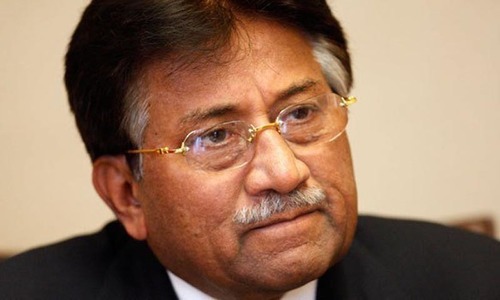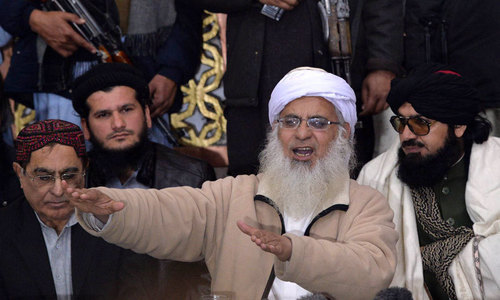ISLAMABAD: A day after former president retired General Pervez Musharraf approached the Supreme Court for permission to go abroad for treatment, the court came up with a judgement on Friday that may make the life of the former military ruler even harder.
A three-judge bench, headed by Justice Asif Saeed Khosa, set aside a Dec 12, 2015, Islamabad High Court order directing the investigation team concerned to re-investigate the treason case by ‘interrogating’ Gen Musharraf, former prime minister Shaukat Aziz, former minister Zahid Hamid and former chief justice Abdul Hameed Dogar as well as persons who could be presumed to be associated with the commission of the alleged crime.
The apex court, which had taken up the appeal of Justice Dogar against the high court decision, expressed the hope that the special court would proceed with the treason trial against Gen Musharraf, who is suffering from a spinal injury, without ‘any unnecessary’ delay.
“For what has been discussed above this appeal is allowed and all references to the present appellant (Justice Dogar) and two others in the impugned orders passed by the special court and IHC respectively as suspects to be associated with any fresh investigation into the offence of high treason allegedly committed by Musharraf are set aside,” said a 14-page verdict authored by Justice Khosa.
The court also made it clear that a fresh investigation into the treason offence by associating any person lay within the prerogative of the federal government and that the special court or the IHC could not name any individual to be associated with any such investigation.
The verdict said that there was no provision in the Criminal Law Amendment (Special Court) Act, 1976, that required the special court to wait for the result of any fresh investigation or to postpone the trial of the accused till an amended or additional statement or list of accused was submitted by the federal government after the fresh probe.
“We are considering instituting a review petition before the Supreme Court after consultation with legal team,” Advocate Chaudhry Faisal Hussain, the counsel for Gen Musharraf, said soon after the announcement of the verdict. It was a constitutional right of his client like other citizens, he added.
As far as the comments against his client in the judgment are concerned, Mr Hussain said, these might prejudice the ‘fair trial’ before the special court, adding that the comments in the judgment amounted to a judicial interference in the pending trial by the Supreme Court which had to hear appeal against the final judgment of the special court.
The SC judgment explained that under Section 5 of the Criminal Law Amendment (Special Court) Act, 1976, the special court had to commence hearing soon after receiving federal government’s complaint against the accused person or persons.
It said the special court seized with the complaint might direct an inquiry or investigation but only for ascertaining truth or falsehood of “the complaint”, i.e. the allegations levelled against the person or persons complained against.
“There is no jurisdiction available with the special court to direct the inquiry or investigation against accused not formally complained by the complainant,” the judgment said, adding that apart from that the inquiry or investigation could be directed by the trial court to be conducted before the issuance of process against the accused, but not at a stage where the trial of the person had already commenced and was nearing its conclusion, as in the present case.
In the judgment, Justice Khosa also reproduced different excerpts from the July 31, 2009, verdict of declaring the Nov 3, 2007, emergency unconstitutional as well as a number of other judgments, including that of the Sindh High Court, to establish that Gen Musharraf had proclaimed the emergency in his own discretion.
But Justice Khosa chose not to give a direct observation in the judgment and said: “We have restrained ourselves from recording our own opinion on the issue lest any opinion expressed may prejudice the pending treason case before the special court.”
The judgment said: “The observations and declarations made by the apex court (earlier) and the SHC have already attained finality and they are in the public domain and thus any reference to the same by us in the present judgment may not be inappropriate.”
Published in Dawn, February 27th, 2016














































